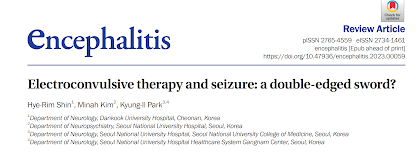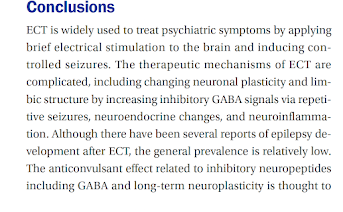ECT: Anti-convulsant or Not? Paper From Korea
Out on PubMed, from authors in Korea, is this paper:
Electroconvulsive therapy and seizure: a double-edged sword?
Encephalitis. 2023 Jul 13. doi: 10.47936/encephalitis.2023.00059. Online ahead of print.PMID: 37621189
The abstract is copied below:
Electroconvulsive therapy (ECT) is a widely used therapeutic option of drug-refractory psychiatric disorders. ECT treats psychiatric symptoms by inducing brief controlled seizures through electrical stimulation, but ECT does not generally cause prolonged seizures or epilepsy. However, several studies have reported cases of prolonged seizures after ECT. This review aimed to determine the mechanism of epileptogenesis with neurobiological changes after ECT. Contrary to epileptogenesis by ECT, several cases have reported that ECT was successfully applied for treatment of refractory status epilepticus. In addition, ECT might be applied to hyperkinetic movement and psychiatric symptoms of encephalitis. We also investigated the anticonvulsant mechanism of ECT and how it controls encephalitis symptoms.
Keywords: Electroconvulsive therapy; Encephalitis; Epilepsy; Epilepsy, Seizures; Status epilepticus.
The paper is here.
And from the text:
This is a slightly goofy paper with a sensationalist title. It reviews the main theories of mechanism of action of ECT, with an emphasis on anti- and pro-convulsant situations. The cartoonish figure and legend are worth a look.






Comments
Post a Comment